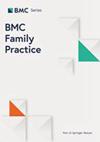COVID-19 期间比利时初级保健实践中的外联工作:PRICOV-19 横向研究的结果
IF 3.2
3区 医学
Q1 MEDICINE, GENERAL & INTERNAL
引用次数: 0
摘要
在 COVID-19 大流行期间和之后,全科医生(GPs)在向弱势人群伸出援手方面发挥着至关重要的作用。然而,他们在履行这一职责时也遇到了许多挑战。本研究的目的一方面是研究诊所特征、患者人群特征和诊所所在地区的贫困程度,另一方面是研究全科医生在 COVID-19 大流行期间开展外展工作的水平。我们分析了来自国际 PRICOV-19 研究的比利时数据。数据是在 2020 年 12 月至 2021 年 8 月期间通过对初级保健中心进行在线调查收集的。通过随机抽样和方便抽样的方式招募从业人员。进行了描述性统计和序数逻辑回归分析。与外展工作相关的四个调查问题构成了结果变量。调整后的模型包括四个实践特征(实践类型、全科医生实习生的教学实践;护士或护士助理的存在以及社工或健康促进者的存在)、两个患者人群特征(社会脆弱性和医疗复杂性)以及地区贫困指数。研究纳入了 462 名受访者的数据。首先,与初级保健医生外展工作明显相关的因素是初级保健医生的类型(全科医生集体工作时开展的外展工作较多),以及是否有护士(助理)、社工或健康促进员。其次,初级保健医生开展外联工作的程度与诊所病人群体的社会脆弱性密切相关。影响外展工作的这一社会脆弱性因素与诊所病人的医疗复杂程度和诊所所在城市的贫困程度有关。在这项研究中,在 COVID-19 大流行期间,全科医生的团体式合作以及至少一名护理、社会工作或健康促进学科工作人员的支持促进了初级保健中心的外展工作。这些研究结果表明,要提高初级保健医生外联工作的有效性,就必须解决实践层面的组织因素。这尤其适用于拥有更多社会弱势病人群体的初级保健医生。本文章由计算机程序翻译,如有差异,请以英文原文为准。
Outreach work in Belgian primary care practices during COVID-19: results from the cross-sectional PRICOV-19 study
General practitioners (GPs) have a vital role in reaching out to vulnerable populations during and after the COVID-19 pandemic. Nonetheless, they experience many challenges to fulfill this role. This study aimed to examine associations between practice characteristics, patient population characteristics and the extent of deprivation of practice area on the one hand, and the level of outreach work performed by primary care practices (PCPs) during the COVID-19 pandemic on the other hand. Belgian data from the international PRICOV-19 study were analyzed. Data were collected between December 2020 and August 2021 using an online survey in PCPs. Practices were recruited through randomized and convenience sampling. Descriptive statistics and ordinal logistic regression analyses were performed. Four survey questions related to outreach work constitute the outcome variable. The adjusted models included four practice characteristics (practice type, being a teaching practice for GP trainees; the presence of a nurse or a nurse assistant and the presence of a social worker or health promotor), two patient population characteristics (social vulnerability and medical complexity) and an area deprivation index. Data from 462 respondents were included. First, the factors significantly associated with outreach work in PCPs are the type of PCP (with GPs working in a group performing more outreach work), and the presence of a nurse (assistant), social worker or health promotor. Second, the extent of outreach work done by a PCP is significantly associated with the social vulnerability of the practice’s patient population. This social vulnerability factor, affecting outreach work, differed with the level of medical complexity of the practice’s patient population and with the level of deprivation of the municipality where the practice is situated. In this study, outreach work in PCPs during the COVID-19 pandemic is facilitated by the group-type cooperation of GPs and by the support of at least one staff member of the disciplines of nursing, social work, or health promotion. These findings suggest that improving the effectiveness of outreach efforts in PCPs requires addressing organizational factors at the practice level. This applies in particular to PCPs having a more socially vulnerable patient population.
求助全文
通过发布文献求助,成功后即可免费获取论文全文。
去求助
来源期刊

BMC Family Practice
医学-医学:内科
CiteScore
3.20
自引率
0.00%
发文量
0
审稿时长
4-8 weeks
期刊介绍:
BMC Family Practice is an open access, peer-reviewed journal that considers articles on all aspects of primary health care research. The journal has a special focus on clinical decision making and management, continuing professional education, service utilization, needs and demand, and the organization and delivery of primary care and care in the community.
 求助内容:
求助内容: 应助结果提醒方式:
应助结果提醒方式:


